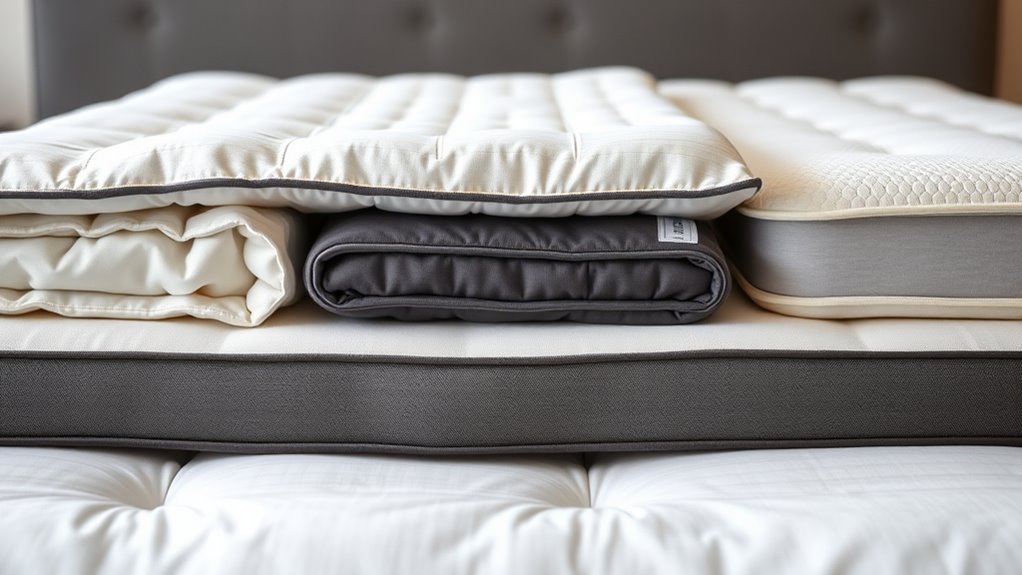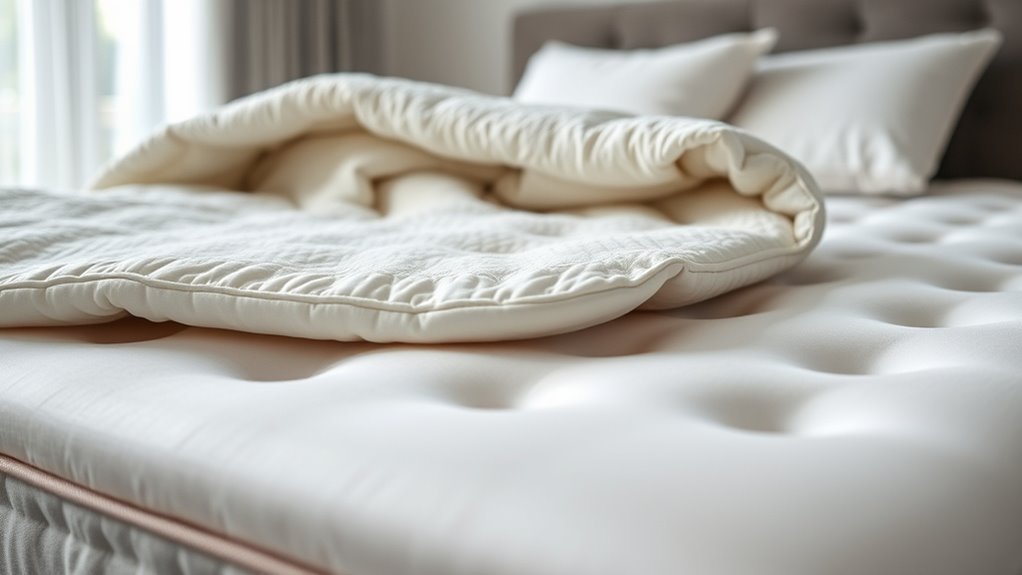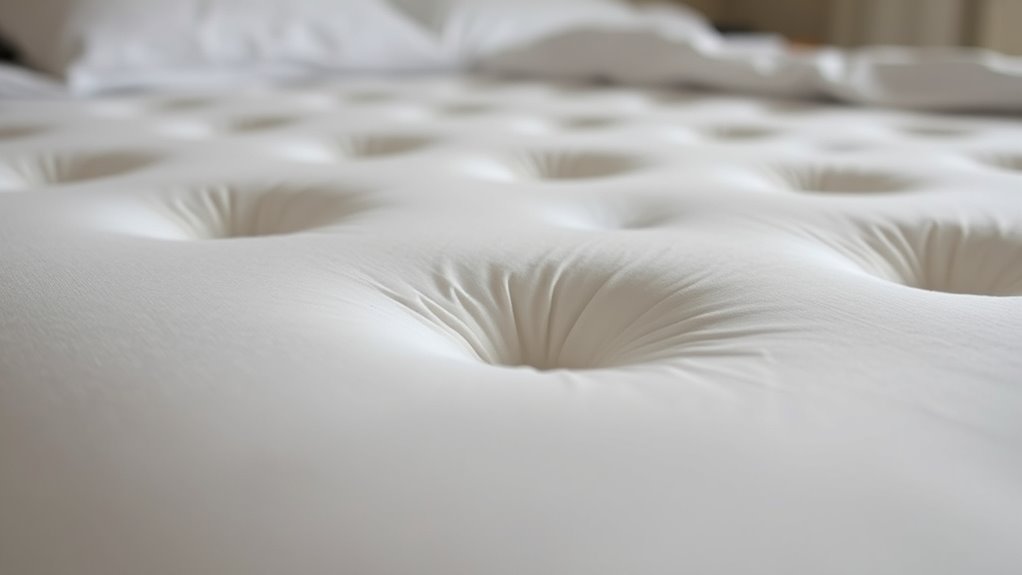Choosing the right mattress firmness impacts your sleep quality and overall wellness. Soft mattresses cushion your body for deep sleep, while firmer options provide support and stability. Your sleep position, body weight, and personal comfort preferences matter. If your mattress feels uncomfortable, achy, or causes tossing, it might not be the right firmness. To find your perfect match, consider testing different firmness levels and paying attention to how your body responds. Keep exploring to discover more tips tailored to your sleep needs.
Key Takeaways
- Mattress firmness affects support, comfort, and sleep quality, with different levels suited to various sleep positions and body types.
- Personal preferences, body weight, and sleep position are key factors in choosing the right firmness for optimal rest.
- Soft mattresses promote deep sleep and contouring, while firmer options provide stability and spinal alignment.
- Misconceptions exist: softness doesn’t always mean comfort, and firmness doesn’t guarantee support—materials matter.
- Testing mattresses in-store, considering trial periods, and paying attention to support signs help find your ideal firmness.
Understanding Mattress Firmness Levels and Their Impact

Since mattress firmness directly affects how you sleep, understanding the different firmness levels is essential for finding the right fit. The firmness influences your sleep cycle by either providing enough support or causing discomfort that disrupts rest. Soft mattresses cushion your body, promoting deeper sleep, while firmer options offer stability for lighter sleep cycles. Mattress materials also play a role; memory foam molds to your body, enhancing support at various firmness levels, whereas innerspring mattresses provide bounce and durability. Knowing the nuances of firmness helps you choose a mattress that aligns with your sleep preferences, promoting uninterrupted sleep and better rest overall. Selecting the right firmness level ensures your sleep cycle remains smooth and restorative, making your nights more comfortable and invigorating.
How Firmness Affects Different Sleep Positions

The firmness level of your mattress can considerably influence how comfortable you feel in different sleep positions. For back sleepers, a medium-firm mattress often offers the right balance of support and pressure relief, helping maintain proper spinal alignment. Side sleepers benefit from softer mattresses that contour to your shoulders and hips, but they also need pillow compatibility to support neck alignment. Stomach sleepers typically require firmer beds to prevent sinking and reduce strain on the neck and lower back. Additionally, your mattress’s firmness can impact temperature regulation; firmer surfaces often promote better airflow, preventing overheating, while softer mattresses may trap heat. Choosing the right firmness ensures your sleep position is supported, comfortable, and promotes overall wellness.
Common Myths About Mattress Softness and Firmness

Many believe that a soft mattress is always more comfortable, but that’s not true for everyone. Similarly, some think firm mattresses only offer support, yet comfort can vary. It’s important to understand that softness and firmness serve different purposes, and your ideal choice depends on your personal needs.
Softness Equals Comfort
A common misconception is that softer mattresses are automatically more comfortable, but this isn’t always true. Comfort depends on your sleeping position, body weight, and personal preferences, not just softness. Many believe that a plush, soft surface enhances bedroom decor, making the space look cozy and inviting. However, mattress materials like memory foam or pillow tops might feel soft initially but still provide adequate support. Softness alone doesn’t guarantee a good night’s sleep; it’s about finding the right balance between softness and support. Overly soft mattresses can cause misalignment, while firmer ones can feel more supportive. Your ideal mattress should complement your bedroom decor while offering the right feel for your comfort and wellness needs.
Firmness Means Support
Despite common beliefs, firmer mattresses don’t always provide better support. Support depends on proper spinal alignment and pressure relief, not just firmness level. A mattress that’s too firm can cause uncomfortable pressure points, disrupting your sleep and affecting your wellness. Your bedroom decor might feature a sleek, minimalist look that matches a firmer mattress, but comfort isn’t solely about appearance. Instead, consider mattress materials like memory foam or latex that contour to your body, offering tailored support regardless of firmness. Remember, support is about how well your mattress responds to your body’s shape and position. Choosing the right firmness means prioritizing support that promotes healthy sleep posture, not just opting for the hardest or softest options.
The Role of Body Weight and Personal Preferences in Choosing Firmness

How does your body weight and personal comfort preferences influence your ideal mattress firmness? Your body weight affects how much pressure your mattress needs to support you comfortably, while personal preferences shape what feels most relaxing. If you have a higher body weight, a firmer mattress might prevent sinking too deeply, offering better support. Conversely, lighter individuals often prefer softer options for added cushioning. Your personal preferences also play a paramount role—some people prioritize firmness for spinal alignment, while others seek plushness for comfort. Consider these factors carefully to find the right fit.
Body weight and comfort preferences are key in choosing your ideal mattress firmness.
- Heavier body weight often requires firmer mattresses for proper support
- Lighter individuals may favor softer, more contouring surfaces
- Personal preferences can override general recommendations, so prioritize what feels best for you
Signs That Your Mattress Firmness Isn’t Supporting Your Sleep

When your mattress firmness isn’t supporting your sleep effectively, you may notice persistent discomfort or pain that doesn’t improve with time. If you wake up stiff or achy, it could be a sign your mattress isn’t providing enough support. Memory foam mattresses should contour to your body without causing pressure points, so if you feel sore, it might be too soft or too firm. Additionally, poor edge support can make getting in and out of bed uncomfortable and cause you to feel unstable when sitting on the edge. If you experience frequent tossing and turning or find yourself waking up frequently, your mattress firmness may be the culprit. Recognizing these signs helps you determine if your mattress needs adjustment to better support your sleep.
Tips for Testing and Selecting the Ideal Mattress Firmness

When testing mattresses, always try them out in the store with your usual sleep positions to see how they feel. Your sleep style, whether you’re a side, back, or stomach sleeper, should guide your firmness choice. Taking these steps helps make certain you pick a mattress that offers the right support and comfort.
Try Before You Buy
Trying out a mattress in person is the best way to determine if it offers the right firmness for your comfort and support. When testing, lie down in your usual sleep position and spend at least 10 minutes to feel how it responds. Focus on how your body aligns and whether pressure points are relieved. For memory foam options, check if the mattress contours comfortably without excessive sinkage. If you prefer a cooler sleep, look for models with cooling gel technology that helps regulate temperature.
- Test different firmness levels to find what feels best for your body
- Bring your pillow to simulate actual sleep conditions
- Consider trial periods or in-store return policies for peace of mind
Consider Sleep Position
Your sleep position plays a crucial role in choosing the right mattress firmness, as it influences how your body distributes weight and relieves pressure. For stomach sleepers, a firmer mattress supports proper spinal alignment and prevents sinking. Side sleepers benefit from a softer surface that cushions shoulders and hips, reducing pressure points. Back sleepers often need a medium firmness that balances support and comfort for the spine. Consider your sleep posture and think about mattress materials—memory foam molds to your body, ideal for pressure relief, while latex offers responsiveness and support. Use this quick guide:
| Sleep Posture | Recommended Mattress Firmness | Key Mattress Material |
|---|---|---|
| Side | Soft to Medium | Memory Foam |
| Back | Medium | Latex or Hybrid |
| Stomach | Firm | Firm Memory Foam |
Frequently Asked Questions
How Often Should I Reassess My Mattress Firmness Needs?
You should reassess your mattress firmness every 1 to 2 years to maintain mattress longevity and make certain it still supports your sleep routine. As your body changes or if your mattress starts to feel less comfortable, adjusting firmness can improve sleep quality. Regular check-ins help you identify when it’s time for a replacement or a firmness tweak, so you keep enjoying restful, supportive sleep night after night.
Can Mattress Firmness Influence Allergy Symptoms or Asthma?
Yes, your mattress firmness can influence allergy symptoms and respiratory health. A firmer mattress may reduce dust mite accumulation, which are common allergy triggers, while a softer one can trap more allergens. If you notice increased allergy symptoms or respiratory issues, consider adjusting your mattress firmness or choosing hypoallergenic materials. This can help improve airflow, minimize allergen buildup, and support better sleep and breathing quality.
Do Age-Related Changes Affect Ideal Mattress Firmness?
Yes, age-related changes can influence your ideal mattress firmness. As you age, your joints, muscles, and spine become more sensitive, making a softer or more supportive mattress better suited for comfort and spinal alignment. You might find that a medium-firm mattress helps reduce aches and improves sleep quality. Adjusting mattress firmness according to your changing needs guarantees better rest and overall wellness as you age.
How Does Mattress Firmness Impact Spinal Alignment and Overall Posture?
Choosing the right mattress firmness directly impacts your spinal support and posture correction. A medium-firm mattress helps keep your spine aligned by supporting the natural curves, reducing strain on your back and neck. If it’s too soft, your spine may sag, causing poor posture. Conversely, too firm can create pressure points. Prioritize firmness that maintains proper spinal support to improve overall posture and reduce discomfort.
Are There Specific Firmness Recommendations for Side Sleepers With Joint Issues?
If you’re a side sleeper with joint pain, opt for a medium to plush mattress that offers pressure relief and minimizes joint stress. These firmness levels help cushion your hips and shoulders, reducing discomfort and pressure points. Avoid too firm beds, which can worsen joint pain. Prioritize mattresses with good contouring support to naturally align your spine and ease joint strain, ensuring better sleep and less pain.
Conclusion
Choosing the right mattress firmness is like finding your perfect dance partner — it guides your moves and keeps you in harmony all night. Don’t settle for a one-size-fits-all solution; listen to your body’s whispers and test with confidence. When you find that sweet spot, sleep becomes a gentle sail on calm waters, not a rocky voyage. Wake up refreshed, ready to take on the day — your dream mattress is waiting just for you.









